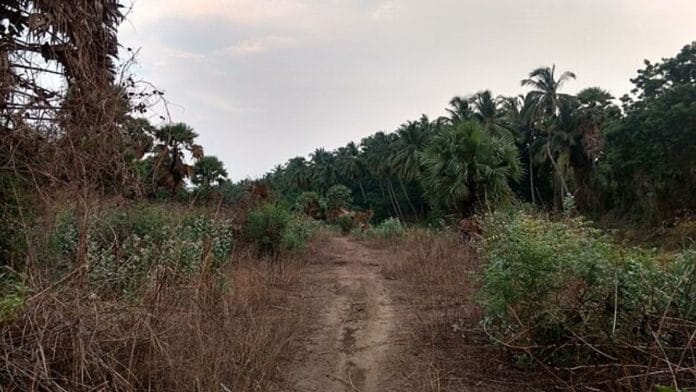Bhopal: A little over a year after the Union government launched the Green Credit Programme (GCP) to promote environment-friendly projects, Madhya Pradesh, which had committed the largest area of degraded land for reforestation, has made little headway.
A senior forest official told ThePrint that payments have been made for just 4.6 percent, or 410 acres, of the total selected land under the scheme, which aims to promote eco-friendly initiatives, like tree planting, rainwater harvesting and waste management to earn tradable ‘green credits’.
Soon after the scheme was kick-started, Madhya Pradesh had identified an area of 11,624 hectares. By July 2024, five Public Sector Undertakings (PSUs) had zeroed in on 8,838 hectares of the total degraded forest identified for plantation.
Indian Oil Corporation Ltd (IOCL) had emerged as the largest player, earmarking 7,083 hectares for plantation, followed by South Eastern Coalfields with 746 hectares and NTPC Ltd with 509 hectares. Northern Coalfields had approved 400 hectares and Power Grid Corporation of India Ltd had committed 100 hectares under the programme.
But, according to data from the forest department, so far Madhya Pradesh government has received payments only for about 410 hectares of the total land selected by PSUs where work has begun.
“Indian Oil Corporation had identified 7,083 hectares in July last year, and ideally the payment should have been made a month or two following it. But nearly eight months down the line, no payment has been released,” Principal Chief Conservator of Forest (PCCF) Purshottam Dhiman, who is overseeing the programme in Madhya Pradesh, told ThePrint.
“Plantation is a time-sensitive activity and the groundwork done prior to the actual plantation needs to start soon. But in the present scenario, the government cannot initiate any activity in anticipation that payment will be made.”
Under the programme rolled out in October 2023, various entities—including industries, Farmer Producer Organisations (FPOs), urban local bodies, gram panchayats and private sector firms—can voluntarily take part in eight eco-restoration activities to earn tradable green credits.
According to government officials, environment-friendly companies can use these green credits to access loans at cheaper rates. Oil and coal companies, including PSUs, can use the tree plantation-based credit programme to meet their Corporate Social Responsibility (CSR) obligations and Environment, Social and Governance (ESG) reporting requirements.
‘Delay a temporary problem’
State government officials are now turning to the Dehradun-based Indian Council of Forestry Research and Education (ICFRE) for guidance on the issue.
An autonomous body under the Ministry of Environment, Forest and Climate Change, ICFRE has been designated as the nodal agency for implementing GCP across the country.
“With ICFRE being the nodal agency, it can get the PSUs to follow through. But despite the issue being raised on multiple occasions, we are still waiting to get any clarity,” a Madhya Pradesh forest department official told ThePrint.
Vijay Kumar, director of the Green Credit Cell overseeing the implementation of GCP at ICFRE, cited multiple reasons for the delay, but said that the government is introducing measures, including limiting the period for blocking land.
The delay is just a temporary problem, he said.
“The scheme is new. It will take a little while for corporators to get convinced and come on board. Even when approved, it has to go through multiple rounds of clearances before the money is disbursed,” Kumar told ThePrint.
“But having said that we cannot block land parcels indefinitely. We will be coming up with measures to free them after the said period soon. The present hold-up is only a temporary problem.”
He highlighted the procedural delays, explaining that once the state government identifies degraded forest areas, approval is sought from ICFRE. After entities select land parcels for plantations in exchange for green credits, a cost estimate is prepared and sent for approval to the nodal agency.
Only after the government’s nod can corporations begin their process. “This is all time-consuming and leads to delays. But we are working to improve the system,” Kumar said.
The Central government has allowed plantation activity for green credits under the first phase of the GCP. Seven other activities, recognised under the umbrella of eco-restoration, will be rolled out in the days to come.
“We have set up a steering committee to come up with an equivalence formula to award these green credits. Two reports by the committee have been submitted and we are going through the details. It will be finalised soon,” Kumar said.
It would make the green credits earned from these initiatives tradable in India’s domestic market.
Independent researcher Kanchi Kolhi, who focuses on environment, forest and biodiversity regulation and governance in India, questioned the viability of the initiative.
“The green credit scheme is driven by the interest of both the private and public sectors to develop green credits for the success of the scheme. The underlying assumption was always that there is interest,” Kohli told The Print. “But the figures show a lack of interest. If the PSUs themselves are finding it hard to invest in it, the viability of the green credit scheme is itself up in question.”
She added: “It may be useful to open up the framework to seek larger inputs and see if it is all viable. And if it is possible, through what frameworks should it be done? How do you actually include communities in it? How do you involve diverse players, especially the local community, and other institutes beyond PSUs to make it viable?
(Edited by Sugita Katyal)






